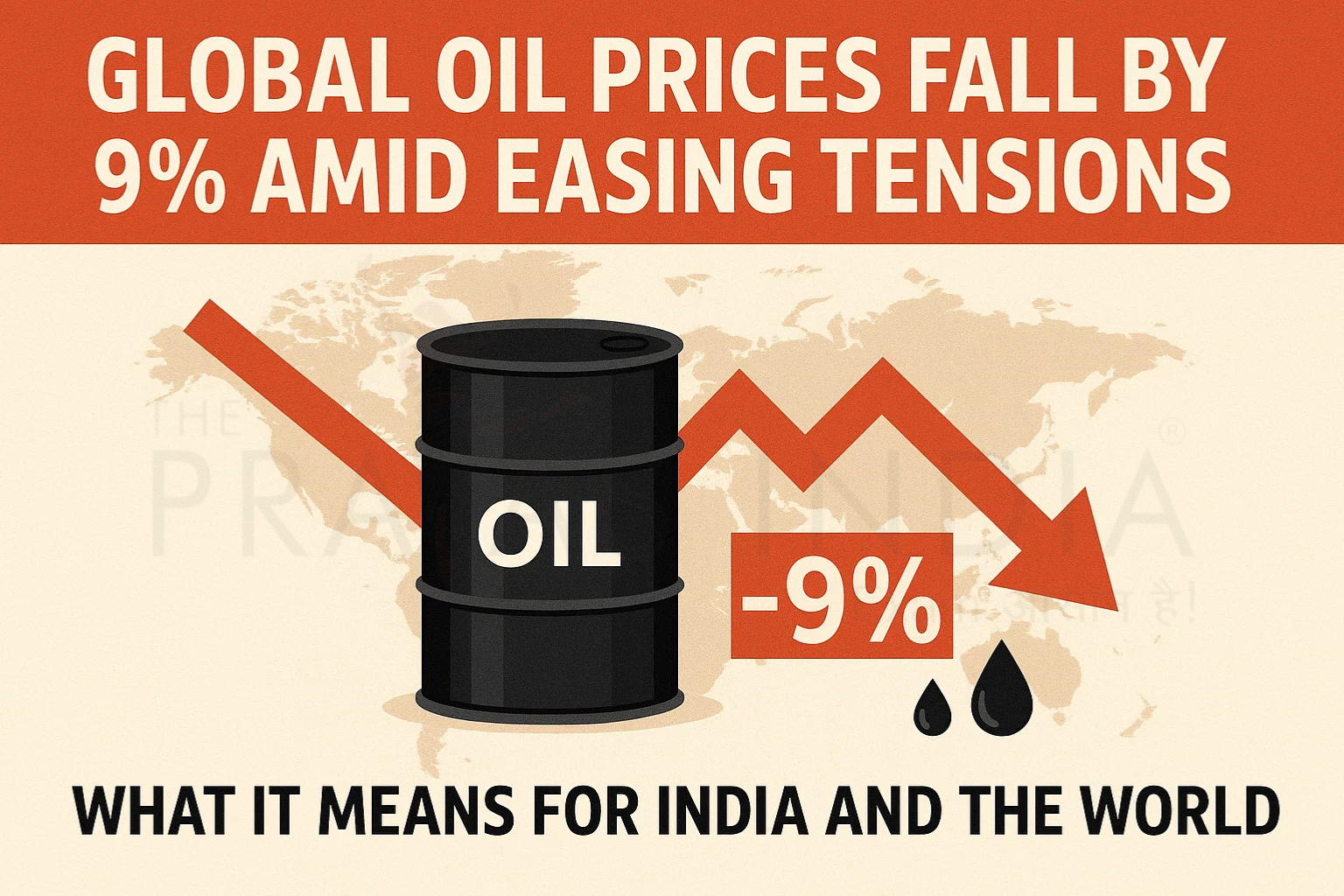Global Oil Prices Fall by 9% Amid Easing Tensions: What It Means for India and the World
Published by The Prayas India | 27 June 2025
In a significant market development, global oil prices dropped by 9%, with the Brent crude benchmark falling to $67.44 per barrel. This sharp decline has been attributed to easing geopolitical tensions in the Middle East, particularly Iran’s decision to retaliate against U.S. military bases without targeting oil transport routes. The development has brought temporary relief to global energy markets and opened discussions on the short- and long-term economic impacts, both globally and for energy-dependent nations like India.

🔍 What Triggered the Price Drop?
The primary reason behind this decline is Iran’s strategic restraint. While the country launched military strikes in response to earlier conflicts, it carefully avoided disrupting the Strait of Hormuz, a critical maritime route through which nearly 25% of the world’s oil flows. This move helped preserve oil supply stability, calming fears of an energy crisis.
The announcement of a ceasefire by U.S. President Donald Trump further reassured markets. Combined, these factors have caused a sharp but controlled fall in crude prices, reversing a previous spike driven by fear and speculation.
🌍 Importance of the Strait of Hormuz
The Strait of Hormuz is one of the world’s most strategic oil corridors. Located between Oman and Iran, it facilitates the transport of oil exports from major producers like Saudi Arabia, the UAE, Iraq, and Iran. Any conflict in this region has immediate consequences for global energy prices.
Fortunately, Iran’s decision to avoid disrupting this route signalled an intent to limit economic damage, even amidst rising political tensions. This helped restore market confidence and pull down crude prices.
📉 Market Reactions and Energy Sector Impact
Global energy markets are highly reactive to geopolitical uncertainty. Earlier this year, oil prices surged amid fears of escalation between Israel, Iran, and U.S. forces. However, with military targets prioritized over oil infrastructure, investor panic subsided.
-
Upstream oil companies (involved in exploration and production) may see reduced profitability due to lower crude prices.
-
Downstream companies (refineries, transporters) benefit from cheaper input costs, improving their margins.
-
Stock markets have responded with mixed signals, as oil price shifts influence related sectors differently.
What This Means for India
India, one of the world’s largest oil importers, is directly impacted by global crude price fluctuations. However, its diversified import strategy has cushioned the blow. According to the Union Petroleum Minister, a significant portion of India’s oil imports does not rely on the Strait of Hormuz, ensuring energy security even in times of global instability.
This price drop offers short-term relief on the import bill, potentially improving the fiscal deficit. However, fuel prices at the retail level may remain unaffected in the immediate term, due to taxation structures and inventory pricing.
📘 Relevance for UPSC & Competitive Exams
This topic is highly relevant for aspirants preparing for:
🔹 GS Paper III – Indian Economy
-
Impact of global events on Indian economy
-
Energy security and crude oil dynamics
-
Balance of payments and fiscal health
🔹 GS Paper II – International Relations
-
India’s strategic energy ties with West Asia
-
Geopolitical stability and its economic consequences
🔹 GS Paper I – Geography
-
Global trade routes and chokepoints
-
Physical features like the Strait of Hormuz
🔹 Essay & Interview
-
Globalisation and interdependence
-
Strategic resilience in uncertain times
✅ Conclusion
The recent decline in global oil prices serves as a reminder of the delicate interplay between geopolitics and economics. While the current drop offers breathing room for importing nations like India, the situation remains fluid. Long-term energy planning, diplomatic engagement, and strategic diversification remain key to ensuring stability.
At The Prayas India, we help aspirants decode such real-time developments with analytical clarity—connecting global events to exam-relevant knowledge.




![Prayas-तेजस [UPSC CSE Sociology Optional] – Online & Offline](https://theprayasindia.com/wp-content/uploads/2025/09/Prayas-तेजस-UPSC-CSE-Optional-Subject-The-Prayas-India-300x300.png)
![Prayas-सूत्र [UPSC CSE Materials (Hardcopy)]](https://theprayasindia.com/wp-content/uploads/2025/09/Prayas-सूत्र-UPSC-CSE-Study-Materials-Hardcopy-The-Prayas-India-300x300.png)
![Prayas-मंत्रा [UPSC CSE CSAT]](https://theprayasindia.com/wp-content/uploads/2025/09/Prayas-मंत्रा-UPSC-CSE-CSAT-The-Prayas-India-300x300.png)
![Prayas सारथी [UPSC CSE One on One Mentorship]](https://theprayasindia.com/wp-content/uploads/2025/09/Prayas-सारथी-UPSC-CSE-One-on-One-Mentorship-The-Prayas-India-300x300.png)










